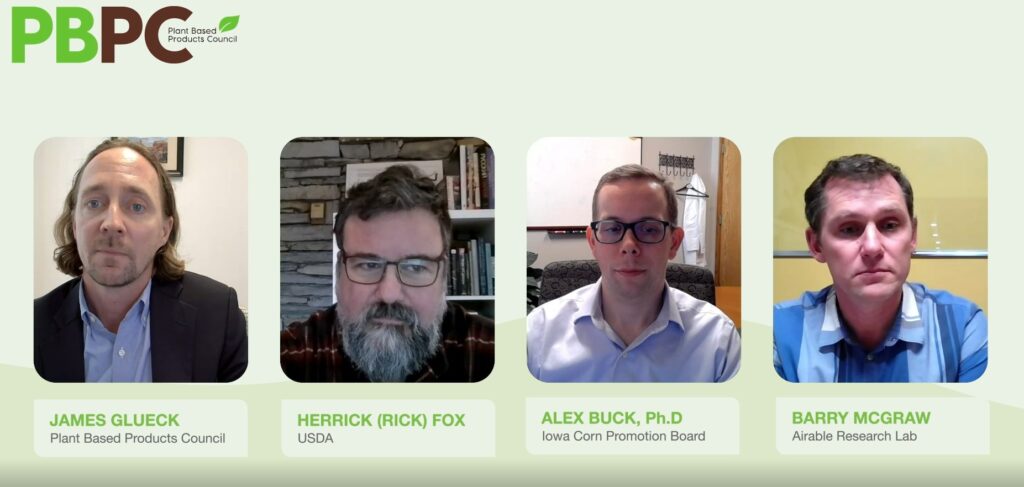12/6
Recap: Pathways to Economic Opportunity and Innovation: Why the Ag Bioeconomy Matters for Rural Development

On Nov. 15, the Plant Based Products Council hosted the latest installment of its Speaker Series, bringing together leaders, policymakers, and experts in the agriculture and plant-based industries to discuss challenges and solutions shaping the sector. The panel, Pathways to Economic Opportunity and Innovation: Why the Ag Bioeconomy Matters for Rural Development, explored the crucial role of the agricultural bioeconomy in creating new markets for farmers and fostering economic success in rural communities.
At the heart of the American ag bioeconomy are rural communities comprised of farmers, processors, manufacturers, and consumers. Investing in ag bioeconomy innovation and infrastructure not only benefits these local communities but also strengthens the industry’s global leadership position. The panel, led by PBPC Executive Director James Glueck, featured industry leaders with expertise in policy, innovation, economic growth, and research and development: Alex Buck, Director of Industrial Innovation at the Iowa Corn Promotion Board; Rick Fox, Bioeconomy Coordinator in USDA’s Office of the Chief Economist; and Barry McGraw, Founder and Chief Laboratory Officer at Arable Research Lab, an Ohio Soybean Council Business Line.

Director of Industrial Innovation, Iowa Corn Promotion Board


Founder/CLO at Airable Research Lab, an Ohio Soybean Council business line
Addressing the Challenges
Panelists first addressed some of the challenges facing biobased development, emphasizing the importance of education and awareness within the biobased community. Rick Fox noted, “One part of the challenges we have right now is just having a shared understanding of what the bioeconomy is.”
Barry McGraw discussed the industry’s value chain as another area that grew over the past two decades. New players have helped increase access to raw materials and biobased chemicals that can be turned into products that meet market demand for corn, soy, and other plant-based goods.
Rising Demand Drives Investments
Panelists discussed the pivotal role that farmers and rural communities play in the bioeconomy, shedding light on strategies to enhance investment and ensure the success of these communities. Rising consumer demand has incentivized companies to purchase more plant-based feedstocks from farmers, breathing new life into biomanufacturing and production. Alex Buck cited the surge in demand as contributing to increased opportunities and economic growth in rural areas.
Innovations and the Benefits of Agriculture Research
Investing in rural communities involves partnerships and research funding that play a pivotal role in addressing industry challenges and fostering growth. Barry McGraw named funding partners and commercial companies who were ahead of the curve and willing to take risks as key players in the research and innovation space. Alex Buck agreed and underscored the role of land grant institutions as invaluable partners in driving crop production research initiatives, and a wide range of universities and partners that are working on scaling cutting-edge technologies and chemistry, emphasizing their pivotal contribution to the industry’s progress.
Job Growth in the Bioeconomy
The bioeconomy industry contributes approximately $470 billion annually to the economy and directly supports around 4.6 million jobs, many of which are in rural communities. As the industry grows, new job opportunities emerge, ranging from electricians to welders to chemical engineers.
Rick emphasized that these jobs offer diverse opportunities, “these are opportunities for high-tech jobs in rural communities which is a new take on community economic development.” Investing in the next generation of workers through scholarship programs and reimagined ag programs is essential for the industry’s continued success.
PBPC is grateful to Alex, Rick, and Barry for joining and sharing their insights. We look forward to hearing from more industry experts and innovators at future PBPC Speaker Series events.
Sign up for news from PBPC to stay updated and click to watch the panel discussion to learn more about why the ag bioeconomy matters for rural development.
